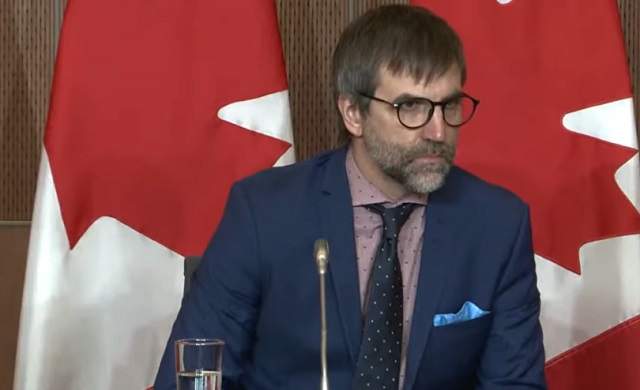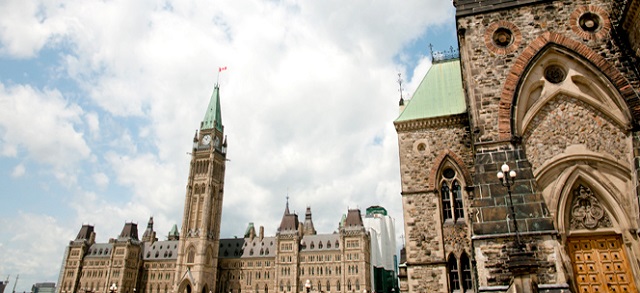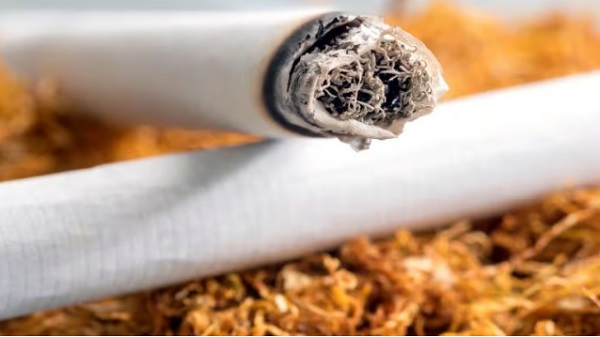Business
Trudeau’s environment department admits carbon tax has only reduced emissions by 1%

From LifeSiteNews
The Trudeau Liberals had first seemed to claim that the unpopular carbon tax had cut emissions by 33%, only to explain that the figure is merely a projection for 2030 and the actual reduction thus far stands at 1%.
The Liberal government has admitted that the carbon tax has only reduced greenhouse gas emissions by 1 percent following claims that the unpopular surcharge had cut emissions by 33 percent.
During a May 21 House of Commons environment committee meeting, Environment Minister Steven Guilbeault testified that the carbon tax cut greenhouse gas emissions by 33 percent, before his department backtracked to explain that the figure is a projection for the year 2030, and that the true figure sits at a mere 1 percent.
“I will be the first one to recognize it is complex,” said Guilbeault, according to information obtained by Blacklock’s Reporter.
“If you want simple answers, I am sorry. There is no simple answer when it comes to climate change or modeling,” he said, adding, “Carbon pricing works. This has never been clearer.”
“Carbon pricing alone accounts for around a third of emission reductions expected in Canada,” said Guilbeault, explaining this number was based on “complex statistical calculations.”
However, Conservative Members of Parliament (MPs) pointed out that the numbers provided by Guilbeault’s department do not add up to a 33 percent decrease in emissions, as the department had characterized.
“How many megatonnes of emissions have been directly reduced from your carbon tax since it was introduced?” Conservative MP Dan Mazier questioned.
According to Guilbeault, after the introduction of the carbon tax, emissions reduced by five megatonnes in 2018, fourteen megatonnes in 2019, seventeen megatonnes in 2020, eighteen megatonnes in 2021, and nineteen megatonnes in 2022.
However, the total tonnes of emissions reduced by the carbon tax comes to 73 million tonnes, or 2 percent, of the combined 3,597 million tonnes of emissions over the same five-year period, according to National Inventory Reports.
According to Blacklock’s, Guilbeault failed to explain how the environment department calculated a 33 percent benefit.
Conservative MP Michael Kram pressed Guilbeault, saying, “I want to make sure I have the math correct.”
“In 2022 emissions were at 708 megatonnes and the carbon tax was responsible for reducing 19 megatonnes,” he continued. “By my math that works out to a three percent reduction.”
Associate deputy environment minister Lawrence Hanson explained that the department’s 33 percent emissions cut is a projection of the emissions cut by 2030, not a current statistic.
“It’s the distinction between how much the carbon price might have affected emissions in one year versus how much in 2030,” said Hanson. “So when you heard us talking about its responsible for one third of reductions we were talking about the 2030 number.”
This explanation was echoed by Derek Hermanutz, director general of the department’s economic analysis directorate, who said, “When we talk about one third, it’s one third of our expected reductions. That’s getting to 2030.”
“Yes, but three percent of the total emissions have been reduced as a result of carbon pricing?” Kram pressed.
“No, emissions have declined three percent in total,” assistant deputy minister John Moffet responded.
“And so only one percent of that three percent is from the carbon tax?” Kram asked.
“To date,” Moffet replied.
Prime Minister Justin Trudeau’s carbon tax, framed as a way to reduce carbon emissions, has cost Canadian households hundreds of dollars annually despite rebates.
The increased costs are only expected to rise. A recent report revealed that a carbon tax of more than $350 per tonne is needed to reach Trudeau’s net-zero goals by 2050.
Currently, Canadians living in provinces under the federal carbon pricing scheme pay $80 per tonne, but the Trudeau government has a goal of $170 per tonne by 2030.
On April 1, Trudeau increased the carbon tax by 23 percent despite seven out of 10 provincial premiers and 70 percent of Canadians pleading with him to halt his plan.
Despite appeals from politicians and Canadians alike, Trudeau remains determined to increase the carbon tax regardless of its effects on citizens’ lives.
The Trudeau government’s current environmental goals – which are in lockstep with the United Nations’ 2030 Agenda for Sustainable Development – include phasing out coal-fired power plants, reducing fertilizer usage, and curbing natural gas use over the coming decades.
The reduction and eventual elimination of so-called “fossil fuels” and a transition to unreliable “green” energy has also been pushed by the World Economic Forum, the globalist group behind the socialist “Great Reset” agenda in which Trudeau and some of his cabinet are involved.
Business
Capital Flight Signals No Confidence In Carney’s Agenda

From the Frontier Centre for Public Policy
By Jay Goldberg
Between bad trade calls and looming deficits, Canada is driving money out just when it needs it most
Canadians voted for relative continuity in April, but investors voted with their wallets, moving $124 billion out of the country.
According to the National Bank, Canadian investors purchased approximately $124 billion in American securities between February and July of this year. At the same time, foreign investment in Canada dropped sharply, leaving the country with a serious hole in its capital base.
As Warren Lovely of National Bank put it, “with non-resident investors aloof and Canadians adding foreign assets, the country has suffered a major capital drain”—one he called “unprecedented.”
Why is this happening?
One reason is trade. Canada adopted one of the most aggressive responses to U.S. President Donald Trump’s tariff agenda. Former prime minister Justin Trudeau imposed retaliatory tariffs on the United States and escalated tensions further by targeting goods covered under the Canada–United States–Mexico Agreement (CUSMA), something even the Trump administration avoided.
The result was punishing. Washington slapped a 35 per cent tariff on non-CUSMA Canadian goods, far higher than the 25 per cent rate applied to Mexico. That made Canadian exports less competitive and unattractive to U.S. consumers. The effects rippled through industries like autos, agriculture and steel, sectors that rely heavily on access to U.S. markets. Canadian producers suddenly found themselves priced out, and investors took note.
Recognizing the damage, Prime Minister Mark Carney rolled back all retaliatory tariffs on CUSMA-covered goods this summer in hopes of cooling tensions. Yet the 35 per cent tariff on non-CUSMA Canadian exports remains, among the highest the U.S. applies to any trading partner.
Investors saw the writing on the wall. They understood Trudeau’s strategy had soured relations with Trump and that, given Canada’s reliance on U.S. trade, the United States would inevitably come out on top. Parking capital in U.S. securities looked far safer than betting on Canada’s economy under a government playing a weak hand.
The trade story alone explains much of the exodus, but fiscal policy is another concern. Interim Parliamentary Budget Officer Jason Jacques recently called Ottawa’s approach “stupefying” and warned that Canada risks a 1990s-style fiscal crisis if spending isn’t brought under control. During the 1990s, ballooning deficits forced deep program cuts and painful tax hikes. Interest rates soared, Canada’s debt was downgraded and Ottawa nearly lost control of its finances. Investors are seeing warning signs that history could repeat itself.
After months of delay, Canadians finally saw a federal budget on Nov. 4. Jacques had already projected a deficit of $68.5 billion when he warned the outlook was “unsustainable.” National Bank now suggests the shortfall could exceed $100 billion. And that doesn’t include Carney’s campaign promises, such as higher defence spending, which could add tens of billions more.
Deficits of that scale matter. They can drive up borrowing costs, leave less room for social spending and undermine confidence in the country’s long-term fiscal stability. For investors managing pensions, RRSPs or business portfolios, Canada’s balance sheet now looks shaky compared to a U.S. economy offering both scale and relative stability.
Add in high taxes, heavy regulation and interprovincial trade barriers, and the picture grows bleaker. Despite decades of promises, barriers between provinces still make it difficult for Canadian businesses to trade freely within their own country. From differing trucking regulations to restrictions on alcohol distribution, these long-standing inefficiencies eat away at productivity. When combined with federal tax and regulatory burdens, the environment for growth becomes even more hostile.
The Carney government needs to take this unprecedented capital drain seriously. Investors are not acting on a whim. They are responding to structural problems—ill-advised trade actions, runaway federal spending and persistent barriers to growth—that Ottawa has yet to fix.
In the short term, that means striking a deal with Washington to lower tariffs and restore confidence that Canada can maintain stable access to U.S. markets. It also means resisting the urge to spend Canada into deeper deficits when warning lights are already flashing red. Over the long term, Ottawa must finally tackle high taxes, cut red tape and eliminate the bureaucratic obstacles that stand in the way of economic growth.
Capital has choices. Right now, it is voting with its feet, and with its dollars, and heading south. If Canada wants that capital to come home, the government will have to earn it back.
Jay Goldberg is a fellow with the Frontier Centre for Public Policy.
Business
Budget 2025 continues to balloon spending and debt

The Canadian Taxpayers Federation is criticizing Prime Minister Mark Carney for ballooning spending and debt in Budget 2025.
“Budget 2025 shows the debt continues to spiral out of control because spending continues to spiral out of control,” said Franco Terrazzano, CTF Federal Director. “Carney needs to reverse course to get debt and spending under control because every dollar Canadians pay in federal sales tax is already going to pay interest charges on the debt.
“Carney isn’t close to balancing anything when he’s borrowing tens of billions of dollars every year.”
The federal deficit will increase significantly this year to $78.3 billion. There is no plan to balance the budget and stop borrowing money. The federal debt will reach $1.35 trillion by the end of this year.
Debt interest charges will cost taxpayers $55.6 billion this year, which is more than the federal government will send to the provinces in health transfers ($54.7 billion) or collect through the GST ($54.4 billion).
Budget 2025 increases spending by $38 billion this year to $581 billion. Despite promises to control spending in future years, Budget 2025 projects that overall spending will continue to rise by billions every year.
“Canadians don’t need another plan to create a plan to meet about cutting spending, Canadians need real spending cuts now,” Terrazzano said. “The government always tells Canadians that it will go on a diet Monday, but Monday never comes.
“And the government isn’t really finding savings if it’s planning to keep increasing spending every year.”
Budget 2025 commits to “strengthening” the industrial carbon tax and “setting a multi-decade industrial carbon price trajectory that targets net zero by 2050.”
“Carney’s hidden carbon tax will make it harder for Canadian businesses to compete and will push Canadian entrepreneurs to set up shop south of the border,” Terrazzano said. “Carney should scrap all carbon taxes, cut spending and stop taking so much money from taxpayers.”
-

 Bruce Dowbiggin2 days ago
Bruce Dowbiggin2 days agoA Story So Good Not Even The Elbows Up Crew Could Ruin It
-

 Agriculture14 hours ago
Agriculture14 hours agoDanish Cows Collapsing Under Mandatory Methane-Reducing Additive
-

 Alberta2 days ago
Alberta2 days agoCanada’s heavy oil finds new fans as global demand rises
-

 Daily Caller1 day ago
Daily Caller1 day agoTrump Reportedly Planning Ground Troops, Drone Strikes On Cartels In Mexico
-

 Health2 days ago
Health2 days agoRFK Jr’s argument for studying efficacy of various vaccines
-

 Addictions2 days ago
Addictions2 days agoThe War on Commonsense Nicotine Regulation
-

 Business1 day ago
Business1 day agoTrump’s Tariffs Have Not Caused Economy To Collapse
-

 Business2 days ago
Business2 days agoCarney government should retire misleading ‘G7’ talking point on economic growth





